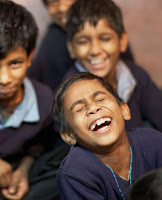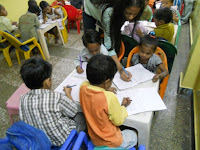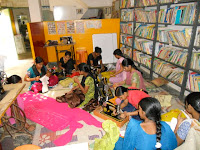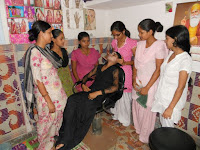The year gone by was once again and thrilling one. We had our share of highs and lows, some quite disquieting.
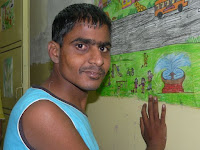
The year dawned with a terrible event that shattered us all. Manu who was the soul and spirit of Project Why passed away gently on a cold January day. Many thought, and quite rightly so that we would cave in and fade away but they were wrong. If Manu was the reason it all began, he was also the force that imbued us to carry on, more so after his passing as that was the only way we could truly honour his memory. The biggest lesson he had given us was that nothing is impossible and that life was to be celebrated no matter how worthless it may seem. So 2011 had to be a special year, one befitting the spirit of Manu. And he did just that. 2011 turned out to be quite an exciting year.
15 August 2011
Independence Day and Ram Goburdhun Centenary Celebrations

Before outlining the activities of different centres, one would like to share the highlight of 2011, which undoubtedly was the celebration of our Independence Day, which coincided with the Centenary of Ram Goburdhun in whose memory Project Why was created.
Children from all centres participated in these celebrations. The show was breathtaking in more ways than one. The passion of the children, the quality of the different items and the warmth of the audience made it a unique experience. The large community hall was packed and the foot tapping music and dance were appreciated by one an all.
You can share some of these very special moments by clicking on the following link:
The magic of a celebration
At the end of the show children who had topped their respective classes were honoured with medals.
It was truly a wow moment for project why.
Number of Staff: 25
OKHLA
Primary Classes
Our Okhla centre has been in existence for six years. The journey began in a garbage dump that we ‘reclaimed’! It all began in a makeshift structure of bamboo and plastic sheets amidst extreme resentment. Today it is a happy centre under a tin roof, with walls and even fans. The centre runs in 2 shifts with boys in the morning and girls in the afternoon.
The children come from extremely deprived homes, most of migrant labour. When we first came in the area 90% of the children were not going to school. Many were peddling drugs or engaged in petty theft. Now all our children are in school and doing well.
In early 2010 we began spoken English classes to help children build their confidence. Children are taught through fun activities like story telling, educational games etc. Environment classes are also held. Children are taught how to keep the neighbourhood clean, prevent disease and make the planet plastic free. Unfortunately we had to close the English classes because of lack of funding.
The primary children were taken for an outing to the Science Museum and participated in a First Aid workshop at the American School.
The Okhla team, staff and children is extremely motivated and committed to their school. It is the only centre where children participate actively in painting the school every Diwali each child contributing five rupees and the teachers coming up with the balance. They have truly taken ownership of their centre.
As each year the children celebrated all the festivals with gusto and joy. A painting competition was organised by them. The children are fond of dancing and always perform for visitors and friends.
Many children topped their respective classes in school and done us proud.
Secondary classes
Secondary were started recently on popular demand as our own students had graduated and wanted to continue studying with us. Children are helped with difficult subjects like maths and English and are also taught to study independently.
Over and above school curriculum, we endeavour to widen the knowledge of the children, something crucial for children from deprived homes. The students are taught to explore encyclopaedias and general knowledge books from our well stocked library. The centre also subscribes to newspapers to help them keep abreast with every day occurrences.
During exam time the students have regular tests based on sample papers. The pressure of exams is such that it leaves little time for extra curricular activities. However for the 15 August celebrations the students wrote and performed a play in English based on the Gandhi’s Dandi march.
The students benefit from the volunteers who come time and again and share their knowledge and skills.
Monday to Friday is reserved for studies, whereas Saturdays are for other activities.
Computer Classes
Computer classes were also started on popular demand as we were told that there were no computer classes in the vicinity and that those that were there were very costly. Thanks to some generous donors we got 3 computers and began classes. These are extremely popular. The classes are taught by Mithu who is physically impaired after polio in his childhood. He was a student of pwhy who showed keen interest in computers. He worked as a teacher’s aide in our main computer centre before taking over the Okhla computer centre.
This year 3 students obtained their certificates and our teacher participated in an one day NIIT teaching workshop. We are in the process of finalising a programme with NIIT. This will enable our students to get NIIT certificates after completion of a 3 month course.
You can read about special moments of our Okhla centre here:
Let my country awake
So many smiles
Happy R Day
GOVINDPURI
Early Education
Early education has always been a great concern for us as early education is still not in the ambit of free education. Experience shows that slum toddlers do not lead a privileged life in the arms of caring parents. By the time they reach school, they are unsocial difficult children who find it extremely difficult to adjust to a set pattern and routine. Our early intervention programme is above all aimed at giving toddlers and pre-schoolers the right to early childhood in a safe environment.
Most of our children come from extremely deprived homes though some also belong to higher social strata, as some parents in the neighbourhood chose to send their children to our crèche.
Our early education programme is divided in two classes:
Crèche: Here the children range from 1 to 5. They are taught poems, counting, how to hold a pencil, draw a straight line. They are also taught to draw, sing and dance.
Prep: After a year in the crèche the children are moved to the prep section where they are prepared for entry into Class I. They are taught English and Hindi alphabets, numbers, etc.
The children enjoy their time with us and make the most of it. Any time you walk into these classes you are greeted with a huge smiles and loud Namastes!
The main drawback of these classes is that we are unable to follow the children once they ‘graduate’ from our programme. This is due to the fact that they come from a slum where we do not have an outreach primary programme or belong to families who put them in better schools.
The programme is also an onerous one as we provide free transport and lunch to many of the students hailing from very poor homes.
This is why we may close the crèche in its present form and eventually think of opening a new one with children from a locality where we have primary outreach
Primary Outreach

This class was started in April 2010, after we closed down two of our small centres.
Many children come from Sanjay Colony and Govindpuri slums. What is quite moving is that some children are also surrogate parents to the younger siblings. The brother looks after the younger sibling in the morning and then hands the child over to the sister after she finishes school. The younger sibling thus spends the day at pwhy!
After a slow start, the centre gained momentum and soon the classes were filled to capacity. The children enjoy their time at project why and are happy learning.
What is remarkable in this class is that Anita, one of the teachers is a project why alumni. She has been with us since nursery and completed her class XII this year.
Many children got good positions in their school exams and were given prizes.
True blue
Only wish it shall be great
Library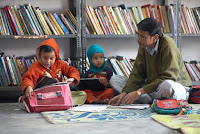
Thanks to a huge donation of books we were able to start a Library in our old classroom in Giri Nagar. Children come and read books or take them home and enjoy the experience. The library also has a TV and DVD player and is thus a cine club! Pwhy children come and see movies or cartoons once a week.
As our librarian has time on his hands, he also runs a small primary class for 20 children from the locality.
Special needs section
The start of 2011 did not augur well for this section as Manu passed away on January 6th leaving all his pals stunned. They grieved for him in the most touching manner but soon realised that life has to go on. A smiling picture of Manu now hangs on the wall reminding each and everyone of us that his spirit is to be honoured.
The plight of children with disabilities has always been of great concern to us as they are by far the most neglected of all. More so as they grow into young adults and become a ‘burden’ for their families. Manu was the most poignant example of this sad reality.
We run a day care for 20 children and young adults with disabilities. The children have a vast array of disabilities both physical and/or mental. The main trust of the programme is to help these children and young adults gain independent living skills and if and when possible some vocational skills to help them become income earning members of their families thus regaining the respect they have often lost.
They also have a lot of creative and fun activities. Dancing is the all time favourite.
A speech therapist visits the centre regularly.
The children are also taught computer skills.
As the section has shifted to a bigger place, we are hoping to be able to add new activities such as cooking, baking, housekeeping, gardening etc. These will prove useful to them in the future.
This year the special children made some beautiful diyas for Diwali. These were sold and with the money they ‘earned’, gifts were bought for all and a super party organised with everyone’s favourite food. Everyone had a ball.
Farewell to Manu
Walk the talk
You take care of them God
Radha is back
Residential Programme for children with disabilities
This programme was a started to ensure that Manu, the young adult with disabilities that we found on the streets 10 years ago has a place to call home. He was then joined by Anjali and Champa who were also homeless and at high risk of being abused. In winter they were joined by Radha for whom the extreme cold is a nightmare in her dark and damp hole. However, Manu passed away, and Anjali left the facility leaving Champa alone. We closed the residential centre and made arrangements for Champa to live with one of the special educators. We were sorry to have had to close this facility as it was a wonderful place!
Here are some glimpses of what life was in this very special place:
We are dancers, we create dreams
Give him his dinner
To the manor born
GIRI NAGAR
Senior Secondary classes
These classes are from IX to XII and focus mainly on mathematics and accountancy, as these are subjects that are feared the most by students. As every year, our students have passed their X and XII with excellent marks and some have even topped their respective schools.
We also sponsored the technical course fees of two of our best students: one for the course of lab assistant and the other for a diploma in electronic engineering.
Why not sponsor a future
Computer classes
Number of students: 38 per batch
Our computer classes are very popular. We have 10 computers and run 6 month courses. Many of our ex students have got jobs in companies, banks, etc.’ Saturdays are reserved for pwhy children.
In 2011, 31 students completed their certificate in a variety of courses Basic, Tally, DTP, Flash Animation, Hardware – and secured good jobs.
After school support for the hearing impaired
Thrice a week we provide space to 20 hearing impaired secondary students for after school support classes. These are run by our special educator.
Boarding school Programme
We sponsor 8 children in a boarding school. These are children from extremely deprived homes and would have never completed their studies and most probably dropped out and become child labour. The children are in different classes and each one of them tops his or her respective class
This is by far our most cherished programme as it is in consonance with what we stand for: equal opportunities for all children born in India. The programme is supported by individual donors.
My never fail feelgood shot
She does not stop smiling
From five to eight
From vedic maths to table manners
Success Stories
Okhla
Kusum hails from Bihar. When her family moved to Delhi she was 12 and had never been to school. She wanted to study but was ashamed of going to school in class I. She joined pwhy and began to learn form scratch. Being bright and motivated she learned quickly and we got her admitted to class VI. Now she is in class X!
Harichanda was 8 when he first came to project why. He did not go to school and would roam the streets and fight with other children. We coaxed him to join the centre and turned out to be a very bright child. We called his mother and asker her why she did not get him admitted to school, she said she was illiterate and did not know how to go about it. We got him admission in class III. Now he is in class VI.
Firoz was 15 and lived closed to the centre. The boy was nice but had got in wrong company and would steal and peddle drugs. He come to us and told us he wanted to study and we accepted him in spite of his age. He slowly dropped his bad habits. He was good dancer so one of our supporters sponsored dance classes for him at the Ashley Lobo Academy. Today he is a driver and has been sent to Mumbai by his company.
Sumit was in class III when he joined us. His elder brother who is 14 is an addict and steals from the goods trains. He stopped coming to the centre and wanted to emulate his brother but we talked to him and he is now coming regularly and also going to school.
Computer section
Abhay was 18 when we first met him. He lived in Delhi with hid grandfather who was very poor. We coaxed him into joining our computer course and he did exceedingly well. We helped him get a job with Vodafone where he is today a team leader earning 15 000 Rs a month.
Mohammed Husain use to iron clothes with his father while studying in school. A bright student he finished his class XII with good marks. Seeing his desire to learn new things we got him to join our computer classes as we felt it would help him accede to a better future. He today works as a computer operator at NDTV and earns 10 000 rs a month.
Preeti is 20. She comes from a poor family and has a mentally challenged sister. She is very bright but had to give up her studies to start cleaning houses to help her family. She wanted to join the computer course so we sponsored her. Today she works in a private company as a computer operator and earns 6000 Rs a month
Note: It is imperative that students acquire a skill to be able to break the cycle they are born in and improve their chances. Many of our students who have completed their studies with us have also completed their computer course. This has enabled them to get good jobs.
Many are employed as computer operators in different organisations earning between 6000 and 10 000 Rs. Some are employed as teachers and a few as hardware technicians.
Number of children: 280
Number of women: 70
Number of staff: 16
Primary Section Class I to V
From the very outset of the project we ran primary classes for the children of the community. The classes are held in 2 shifts: boys in the morning and girls in the afternoon. Each shit was divided in two 1.30 minutes shifts.
Many of our children have left the centre as their families had to relocate because of the increase in rents. Most of our children are from migrant families and thus live on rented premises. Till recently rents were low in Khader Village but the construction of the metro resulted in rents being upped and thus inaccessible to migrant families.
At first we thought of looking for new children but then, after much deliberation decided to change our focus from ‘quantity to quality’ and thus instead of enrolling more children we decided to increase their timings. Now children stay for an extra hour and half and are taught spoken English and general knowledge. This ranges from teaching them about the environment to story telling, science, geography, creative activities etc all taught in an interactive and fun manner.
In the global economy of today, helping the children improve their ability to speak English guarantees them better job options when they finish their studies. Children do learn English at school, but teaching quality is state run schools is poor and most children do not have the sort of home environment where they are encouraged to speak it or indeed have anyone to speak it with and are thus lacking in confidence. Sadly the spoken English classes have been closed down as the persons funding this programme expressed their inability to continue doing so.
We also want to try and make our children better citizens and hence the general knowledge component which is designed to enable them to acquire more rounded life skills.
Moreover the new education policy whereby no child can fail till class VIII has made it imperative for us to educate children, as education in Government schools is practically non-existent.
Secondary Section
These classes are also held in two shifts. Emphasis is laid on the school curriculum and teaching the child to study independently and enable him to get good results in the school leaving examinations and thus accede to further education.
Computer Classes
This class was started on popular demand by the children, who are fascinated by computers. Thanks to some generous donors we have 5 computers. The children enjoy these classes immensely and always ask for more.
Spoken English:
This class was launched in April 2010.
The main focus in the English classes is as follows:
Encourage the child to use language in speech to express feelings and opinions, to reach out to others, and thus slowly accept English as a means of communication.
Emphasis is laid on motivating the child to use language even if there are errors. Correction is incorporated gradually and gently.
The classes have been a huge success but the departure of the teacher and shortage of funds have forced us to suspend them for the time being.
Environment and awareness
The first issues taken were water and plastic as well as cleanliness of the surroundings. This is particularly relevant as the centre is located in a village where access is trough a small lane replete with buffaloes. Children were also encouraged to plant some green plants and learn to tend to them and respect them.
Water and the plastic menace are issues that are discussed on a daily basis as 10 minutes are set aside for this after every class. Children are encouraged to come up with their own solutions. In one case children felt that too much water was wasted while drinking water from the Mayur jug at the women centre. It was decided that children would have water drinking water breaks and these would be supervised by a class monitor! Some children have now stopped bringing plastic bags and urge their friends to do the same. Peer pressure seems to be the best way to ensure such changes! Waste water is also used to water the plants
On Saturday the children clean the surroundings of the centre. Though there was initial resistance from the community who felt that we were making children do ‘dirty’ work, we were able to convince them that this was not the case and now we find some of the older ladies helping with the cleanliness campaign!
Several issues were covered this year. Workshops on the following issues were held: Right to Education, Constitution of India, Jan Lok Pal bill etc. A sex education workshop was held for girls only.
Creative activities
Children are encouraged to express their views through essay competitions. The children were asked to write on a variety of subjects.
A six week photography workshop on the theme ‘respect’ was held in July/August for 6 children of class VII. The children exhibited their work during our 15 August celebrations and everyone was touched by the sensitivity of the pictures. These children are given cameras every day for half an hour to chronicle the activities of their centre.
Children also painted posters for the annual Pantomime show held in the UK. The theme this year was Jack and the Bean Stalk.
Children celebrated Gandhi Jayanti and Children’s Day. They made posters on the lives of Gandhi and Nehru. A science competition was also organised and the children from all classes made interesting models.
We have now decided that once a month we will organise an open day where each class will report on what they have done individually and as a class.
Sewing Classes
The classes are taught by two young ladies who did their training at our centre.
The classes are held thrice a week from 10 to 3. Timings are flexible to suit the trainees, as many have home and families to tend to. Certificates are given every six months
Some of our ex trainees are now gainfully employed. While some have taken full time employment others get contractual jobs from export houses that they do at home. The certificates help them in securing such work.
Beauty Classes
Classes are held daily and are very popular. Some trainees have secured jobs in local beauty parlours. Others work from home.
Adult education classes for women
In order to promote adult education we have made these classes compulsory for all women attending sewing and beauty classes. The classes are for 30 minutes. The women have to pass a small exam. If they do not clear it they do not receive their vocational certificate. We had to resort to this extreme measure as when the course was optional, ladies always found an excuse not to attend
Awareness within the community
Regular meetings are organised with the parents of our children. These enable us to discuss many issues: Right to Education, Corporal Punishment, Nutrition, Vaccination etc.
Counselling
Counselling is done on a case-to-case basis. It maybe counselling the children on issues like stealing, fighting, lying etc or counseling parents. Recently one of our student’s got an opportunity to learn classical music, something he was very interested in. The father was against the idea but we managed to convince him. Young Parveen performed in public at a recent show.
Challenges
Rent raise: With the construction a metro line in the vicinity, rents in Khader village have shown an exponential increase. Most of our children are from migrant labour families and lived till date in rented rooms in the village. Many have had to relocate in cheaper areas leading to the children having to leave the centre. We too fear that our landlord may soon do the same.
Girl child:
Education of girls in India has always been a challenge particularly in underprivileged homes. When a girl is born the main worry of her parents is to start saving for her marriage. Education is secondary. Hence girls are sometimes not sent to school and even if they are the school is not a priority. Often girls are held back at home for household chores or to look after younger siblings. We even have 6 years old looking after their little brothers or sisters.
We even lost two of our brightest girls as they were sent to the village to look after their ageing grandparents!
Gender equality is one of the issues that we raise both with the children and during parents meeting and community awareness meetings.
No fail policy
The new education policy voted this year stipulates that no child will fail till class VIII. This child friendly policy works well in good schools where internal assessment in house monitoring ensures that children learn. In state run schools however there is no teaching at all and children are pushed from class to class. If some kind of support is not given the children from underprivileged homes will remain practically illiterate! This makes our role more challenging and important.
Social issues.
In spite of our having been on the field for almost three years we realise that social change is slow to come and has to be pursued with patience and determination. Issues like beating of children in homes, limiting the size of the family, early marriage of girls, domestic violence are those we try to address relentlessly.
SUCCESS STORIES
Neetu is 20 and passed her class XII. She has 5 siblings. She is physically handicapped because of polio. After the death of her father she was terribly depressed, as she did not see what her future would be. She joined us as a crèche aide but then went on to complete her beautician training. When our previous teacher left we decided to give her a chance and employed her. Today she runs our beautician programme with flair and commitment; Neetu has reason to smile again.
Sonia is self-taught. Her father runs a small tea stall and the family is poor. Sonia wants to do a BA in Education but did not want to be a burden for her father. She completed a computer course in an NGO but no one was willing to give her a job as she did not have the right social profile. We did. Today she can aspire to her dreams.
Geeta has passed her class XII and done a Teacher’s Training Course. She is 36 and has two children. Her husband is a drunk and does not earn anything. Geeta bears all expenses of the home and is always in financial straits. Her in-laws are no support at all. She came for her job and we gave her one. She is our secondary teacher and a very good one. Now she can support her family and above all the education of her children.
Bhuvnashewari is in class 3 and is 13. For along time she could not go to school because her parents were construction workers working at different places. Now her father has got a job and the mother still works on sites. Bhuvnashewari does all the housework, washes clothes, cooks and cleans. If things are not done properly, she is beaten by her mother. But she has dreams and wants to study and be a doctor. Will we be able to fulfil her dreams.
Rakhi is 21 and cleans people’s home and cooks for them. She wants to study and comes to the centre in the afternoons. She had always wanted to go to regular school but never could as her family needed her support and she began to work at the age of 7. She lives in rented premises and her dream is to one day own a small house.
Shezadi is 17 and has 5 siblings. She works in people’s home since the age of 10 and has never been to school. Her father is a construction worker. She had always wanted to study and be doctor or teacher to earn enough money to look after her mother who is ailing. She comes to our centre to be able to learn and perhaps change her life.
Amita is 15 and lives with her uncle and aunt. Her father lives in Nepal and she has 6 siblings. She was sent here to earn and send money to her village as her father is ailing and the sisters need to be married. She comes to our adult education class and dreams of being a teacher.
IMPACT
Stitching Classes:
Madhu Singh, Hansa Devi, Indira Yadav , Savitri Kumari and Bhavna are now able to add to the family income by bringing contract work at home!
Chanda and Asha now employed in export houses.
Drop out rates.
Drop out rates have been arrested and our children are often topping their classes.
Empowerment of women
Village women are now coming out of their homes to acquire a skill. We hope this is the first step towards their empowerment
Social impact
The village is inhabited by people of different castes and communities. There are even separate areas for each caste/community. However at project why they all come under one roof to learn, thus breaking age-old barriers. This is very encouraging as women who never spoke to each other are doing so and who knows maybe friendships are being formed.
Celebrating Gandhi Jayanti
English medium stars
Girl and the broom
Incredible team
On borrowed time
THE FUTURE
We hope to be able to continue our work for years to come, as true change cannot be achieved in a limited time. To see the real impact of our programmes, be it with children, women or the community we need to be able to carry on our activities for at least some more years. This would enable us to work out a transition where the community itself will be empowered enough to spearhead activities and generate resources. Otherwise our work would have been in vain.
However the past year has been a difficult one and the next one looks bleak. Unless we get some firm commitments we might have to close some sections of our project.
I just hope it does not come to that!


